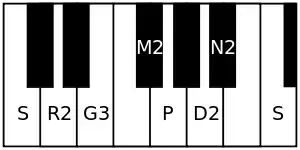Vachaspati (raga)
Vachaspati (pronounced Vāchaspati, meaning Lord of speech) is a rāgam in Carnatic music (musical scale of South Indian classical music). It is the 64th melakarta rāgam in the 72 melakarta rāgam system. It is known as Bhushāvati according to the Muthuswami Dikshitar school.[1][2] It was borrowed into Hindustani music, like many other ragas from Carnatic rāgams.[1][3]
| Arohanam | S R₂ G₃ M₂ P D₂ N₂ Ṡ |
|---|---|
| Avarohanam | Ṡ N₂ D₂ P M₂ G₃ R₂ S |
| Equivalent | Acoustic scale |
| Carnatic music |
|---|
 |
| Concepts |
| Compositions |
| Instruments |
|
Structure and Lakshana

It is the 4th rāgam in the 11th chakra Rudra. The mnemonic name is Rudra-Bhu. The mnemonic phrase is sa ri gu mi pa dhi ni.[2] Its ārohaṇa-avarohaṇa structure (ascending and descending scale) is as follows (see swaras in Carnatic music for details on below notation and terms):
- ārohaṇa: S R₂ G₃ M₂ P D₂ N₂ Ṡ[lower-alpha 1]
- avarohaṇa: Ṡ N₂ D₂ P M₂ G₃ R₂ S[lower-alpha 2]
This scales uses the notes chathusruthi rishabham, antara gandharam, prati madhyamam, chathusruthi dhaivatham and kaisiki nishadham. It is a sampoorna rāgam - a rāgam that has all seven swaras (notes). It is the prati madhyamam equivalent of Harikambhoji, which is the 28th melakarta scale.
Janya rāgams
It has many janya rāgams (derived scales) associated with it, out of which Bhooshavali and Saraswathi are popular. See List of janya rāgams for all scales associated with Vachaspati.
Popular compositions
Vachaspati is close to Kalyani (which is 65th melakarta) and differs only in the nishādham. Still, this rāgam does not have many compositions. At the same time many composers have used this rāgam for composing 1 song each.
Popular compositions in this rāgam are
- Pahi Jaga janani by Swathi thirunal
- Kantajoodumi by Thyagaraja
- Paraatparaa by Papanasam Sivan
- Sahasrakara mandithe by Muthiah Bhagavatar
- Ennaadu ni kripa by Patnam Subramania Iyer.
- Râjarâjeswari - pada varnam by Kalyani Varadarajan
- Shri sachidananda kandam by Meesu Krishna Iyer
- Ennathai Sonnalum by Oothukkadu Venkata Kavi
- Ihapara Sukha Dayaka by Kotteswara Iyer
- Antharangamellam Ariyayo by Suddhanandha Bharathi
- Nutintu Sadambuja by Dr M Balamuralikrishna
- Veru Thunai by Ramaswamy Sivan
- ADAda manam ADum by Neela Ramamurthy
- dEvi jaganmOhini by Neela Ramamurthy
- shrIpatE jaya by Thulaseevanam
- Pachai nayaki paksham vaithu endhan by D.Pattammal
- Vandanamu - Thana Varnam by Tiger Varadachariar
Film Songs
Language:Tamil
| Song | Movie | Composer | Singer |
|---|---|---|---|
| Nikkattumaa Pogattuma | Periya Veetu Pannakkaran | Illayaraja | Mano, K.S. Chitra |
Janya Ragam: Saraswathi
| Song | Movie | Composer | Singer |
|---|---|---|---|
| Aahaa Ivar Yaaradi | Mohini | C. R. Subburaman | P. Leela,K. V. Janaki |
| Sri Saraswathi Dhevimatha
(Ragamalika:Saraswathi,Sriranjani,Lalitha) |
Rani Lalithangi | G. Ramanathan | P. Leela,D. B. Ramachandra |
| Veena Vani | Ponmegalai | Illayaraja | Kalpana,VV Prasanna |
| Malargaley(Interludes only) | Love Birds | A. R. Rahman | K. S. Chithra, Hariharan |
| Kanava Illai Kaatra(In charanam) | Ratchagan | Srinivas | |
| Medhu Medhuvai | Jai | Mani Sharma | S. P. Balasubrahmanyam, K. S. Chithra |
Related rāgams
This section covers the theoretical and scientific aspect of this rāgam.
Vachaspati's notes when shifted using Graha bhedam, yields 3 other major melakarta rāgams, namely, Charukesi, Gourimanohari and Natakapriya. Graha bhedam is the step taken in keeping the relative note frequencies same, while shifting the Shadjam to the next note in the rāgam. For further details and an illustration refer Graha bhedam of Vachaspati.
Vachaspati corresponds to the Acoustic scale in Western music.
Notes
- Alternate notations:
- Hindustani: S R G M̄ P D Ṉ Ṡ
- Western: C D E F♯ G A B♭ C
- Alternate notations:
- Hindustani: Ṡ Ṉ D P M̄ G R S
- Western: C B♭ A G F♯ E D C
References
- Raganidhi by P. Subba Rao, Pub. 1964, The Music Academy of Madras
- Ragas in Carnatic music by Dr. S. Bhagyalekshmy, Pub. 1990, CBH Publications
- Ravikiran, Chitravina N.; Ramanathan, Sharada (12 April 2002). "Carnatic music – a complete system". The Hindu. Retrieved 27 July 2020.